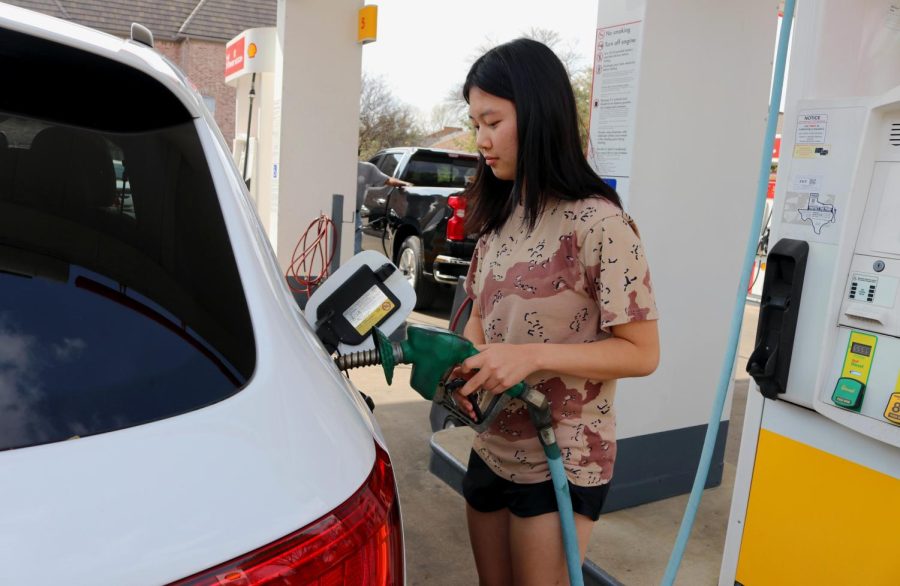The sanctions placed on Russia in response to the war in Ukraine have begun to increase gas prices, affecting the lives of students.
“I have friends who have to pay for their own car, and [now they] have to work extra to pay for gas,” junior Wagner Perry said.
In support of Ukraine, President Joe Biden sanctioned Russia’s oil exports, causing a lower supply of oil available to Americans. This low supply combined with high demand nationwide is the main cause of this gas price increase.
Senior Matthew Mattei is feeling the effects of gas prices increasing. He recently paid $80 to fill up his car.
“It is more expensive to go just about anywhere, especially since Dallas is such a wide city [where you] drive most places,” Mattei said.
Despite the gas increase, Mattei is glad that the U.S. sanctioned imports of Russian oil because he believes that without these sanctions, Russia will carry on their hostile behavior.
“Russia is largely propped up by the oil and gas industry, [so] by continuing to buy oil and gas during this period, it would fuel Russian aggression just about everywhere,” Mattei said.
Perry has a different view than Mattei. Perry thinks that the executive and legislative branches are to blame for the rising prices of gas.
“The Ukraine invasion is a problem, but [our government] could have thought about the economy as a whole and how it would be affecting people,” Perry said.
AP Economics teacher Jerry Howland is conflicted on how he feels about U.S. sanctions on Russian oil.
“It leads to the increase of gas prices, but there is a moral question about whether you approve of the Russian actions [in] Ukraine,” Howland said. “There is no simple answer because you will have more pain at the pump versus the moral implications.”
Howland thinks that people will spend less money on other items and more on gas, potentially leading to a a stagflation situation, where prices rise but economic activity falls, or a recession.
Additionally, he worries other industries will be affected as a result of U.S. sanctions.He worries that since the prices of gasoline have gone up, the price of food will go up as well because food transportation will cost more.
“It has the potential to be worse [than the 2008 recession], but it depends on other factors too,” Howland said.
In Howland’s experience, gas prices always fluctuate.
“That’s normal for supply and demand forces,” Howland said. “It’s just the way the market works.”
However, because of the intensity of this conflict and the actions taken by the U.S. government, Howland believes that the effects will remain.
“I think estimates are two to four years for the oil prices to stabilize, so it could take that long to resolve,” Howland said.
The U.S. Energy Information Administration forecasted in mid-March that gas prices would continue to rise for the rest of the first half of 2022, then start to fall.
Oil companies such as Exxon Mobil and Chevron plan to ramp up production, but the effects of this effort will not be immediate especially as they continue to struggle with worker and material shortages.
One way state and federal governments could lower prices is through removing gas taxes, which are primarily used to fund roads and transit infrastructure.
“That would be an immediate thing that could lower it but that’s not the bulk of the price,” Howland said. ”That would be 30 to 50 cents or somewhere in that ballpark.”
President Biden announced a plan saying that the U.S. would release 1 million barrels of oil from emergency reserves per day for the next six months, which he claimed could bring the price down 10 to 35 cents per gallon.
However, junior Hammer Jewell believes that this is neither efficient nor a good solution.
“He didn’t really do anything, he just made people feel better about where gas prices were,” Jewell said.
Though Jewell said he noticed a price decrease by 5 to 7 cents per gallon in the neighborhood, he doesn’t think it’s a significant change.
“Saving a few cents a gallon is nice but is not a long term solution,” Jewell said. “It is a cheap short term solution.”




